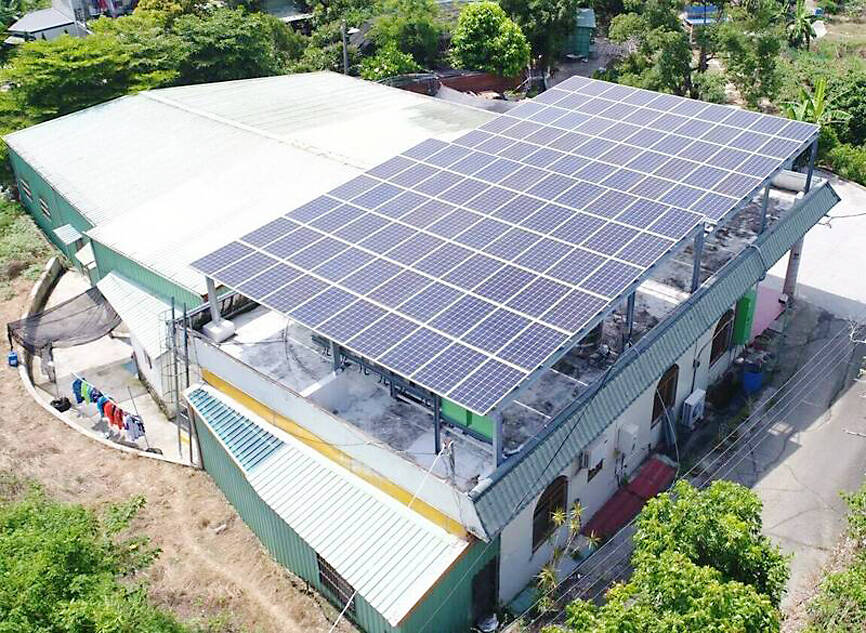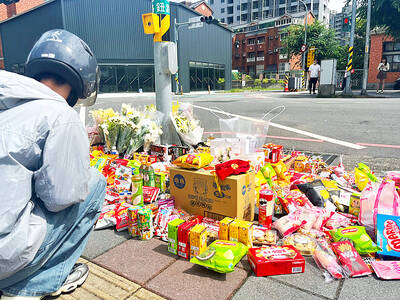The Executive Yuan yesterday approved a four-year plan to offer subsidies of up to NT$300,000 (US$9,248) each to install rooftop solar panels on private residential buildings.
This comes as the Ministry of Economic Affairs moved back a target for solar photovoltaic (PV) installations to 2026.
Owners of buildings with roofs smaller than 1,000m2 and solar energy companies can apply for a subsidy of up to NT$3,000 per kilowatt (kW) of installed capacity, for a total of up to NT$300,000 per project.

Photo: Taipei Times
The program, which is to run from next year to 2028, is projected to cost NT$4.08 billion and increase rooftop power generation by 1.2 gigawatts (GW).
Taiwan has 13.82GW of PV installations, of which 8.76GW, or 63 percent, comes from rooftop solar power systems.
Most of the installations are on medium-sized or large buildings, meaning that small roofs would be the main driver of growth moving forward, Vice Minister of Economic Affairs Lien Ching-chang (連錦漳) said.
Compared with ground-mounted systems, rooftop solar is a more mature technology and is less controversial, the ministry said.
Previously, the economics ministry and the Ministry of the Interior discussed expanding PV installations to all new or renovated buildings with roofs larger than 1,000m2.
For smaller rooftops, the economics ministry has offered subsidies through feed-in-tariff (FIT) rates, which stand at NT$5.7 per kilowatt-hour (kWh), better than the rate for ground-based systems at NT$3.7 per kwH.
The economics ministry said it simplified the application process for households, so that when people register equipment, they can simultaneously apply for the subsidy.
There are five documents required: an application form, identification, equipment registration, a payment receipt and a bank account passbook photocopy, it said.
The economics ministry estimated that the program would attract 120,000 participants.
If they apply for about 10kW each, it would increase total rooftop capacity by 1.2GW, which translates to 1.5 billion kwH per year, it said.
The cost of rooftop solar panel installation is between NT$55,000 and NT$60,000 per kilowatt, Energy Administration Director-General Yu Cheng-wei (游振偉) told a news conference.
Some administrative regions already have PV subsidies in place, he said, adding that the economics ministry’s initiative is meant to support the common goal of achieving net zero emissions.
Last year, renewable energy sources accounted for 9.5 percent of Taiwan’s total electricity generation.
Solar energy accounted for about half of the energy generated from renewables, or between 4 and 5 percent of total electricity generation, economics ministry data showed.
Additional reporting by CNA

Nvidia Corp yesterday unveiled its new high-speed interconnect technology, NVLink Fusion, with Taiwanese application-specific IC (ASIC) designers Alchip Technologies Ltd (世芯) and MediaTek Inc (聯發科) among the first to adopt the technology to help build semi-custom artificial intelligence (AI) infrastructure for hyperscalers. Nvidia has opened its technology to outside users, as hyperscalers and cloud service providers are building their own cost-effective AI chips, or accelerators, used in AI servers by leveraging ASIC firms’ designing capabilities to reduce their dependence on Nvidia. Previously, NVLink technology was only available for Nvidia’s own AI platform. “NVLink Fusion opens Nvidia’s AI platform and rich ecosystem for

WARNING: From Jan. 1 last year to the end of last month, 89 Taiwanese have gone missing or been detained in China, the MAC said, urging people to carefully consider travel to China Lax enforcement had made virtually moot regulations banning civil servants from making unauthorized visits to China, the Control Yuan said yesterday. Several agencies allowed personnel to travel to China after they submitted explanations for the trip written using artificial intelligence or provided no reason at all, the Control Yuan said in a statement, following an investigation headed by Control Yuan member Lin Wen-cheng (林文程). The probe identified 318 civil servants who traveled to China without permission in the past 10 years, but the true number could be close to 1,000, the Control Yuan said. The public employees investigated were not engaged in national

ALL TOGETHER: Only by including Taiwan can the WHA fully exemplify its commitment to ‘One World for Health,’ the representative offices of eight nations in Taiwan said The representative offices in Taiwan of eight nations yesterday issued a joint statement reiterating their support for Taiwan’s meaningful engagement with the WHO and for Taipei’s participation as an observer at the World Health Assembly (WHA). The joint statement came as Taiwan has not received an invitation to this year’s WHA, which started yesterday and runs until Tuesday next week. This year’s meeting of the decisionmaking body of the WHO in Geneva, Switzerland, would be the ninth consecutive year Taiwan has been excluded. The eight offices, which reaffirmed their support for Taiwan, are the British Office Taipei, the Australian Office Taipei, the

DANGEROUS DRIVERS: The proposal follows a fatal incident on Monday involving a 78-year-old driver, which killed three people and injured 12 The Ministry of Transportation and Communications yesterday said it would lower the age for elderly drivers to renew their license from 75 to 70 as part of efforts to address safety issues caused by senior motorists. The new policy was proposed in light of a deadly incident on Monday in New Taipei City’s Sansia District (三峽), in which a 78-year-old motorist surnamed Yu (余) sped through a school zone, killing three people and injuring 12. Last night, another driver sped down a street in Tainan’s Yuching District (玉井), killing one pedestrian and injuring two. The incidents have sparked public discussion over whether seniors